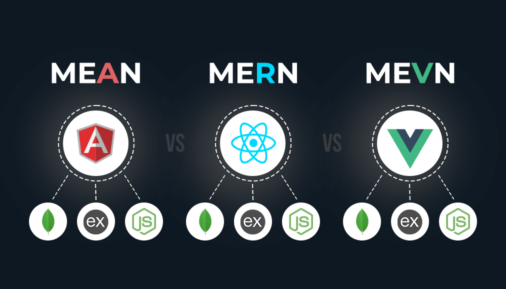DevOps and Agile are related but not the same. DevOps is a set of philosophies and practices generally easier to implement than Agile, but the two can work well together. By understanding how they’re different and work together, you’ll have a better chance of finding success in your projects. There are various software development methodologies, with the Agile being popular among them. The Agile methods help improve the project’s speed and quality, but you can’t just focus on one without the other.
Various aspects should go into your project when choosing a software development methodology, such as what kind of software you’re developing and how open-source platforms are involved. While DevOps and Agile share many aspects, they have differences as well. In this article, we’ll look at how to use DevOps with Agile and some other aspects involved.
What is DevOps Methodology?
DevOps automates repetitive tasks in the development lifecycle and deployment to the production environment. It’s a hybrid, blended approach, which means it does not focus solely on one aspect or method; instead, it has both Agile and DevOps parts using continuous integration (CI). CI is a core concept of DevOps. Top DevOps solutions include Puppet, Chef, and Ansible. DevOps focuses on streamlining processes to shorten time-to-market and release cycles so that you can deliver features quicker for end users.
 While Agile is an approach to scaling agile software development and team productivity in general, it focuses mainly on field-tested processes for the entire modeling cycle. DevOps uses Agile methods to make some aspects of this model more efficient and predictable. A number of different methodologies make up DevOps. Some include:
While Agile is an approach to scaling agile software development and team productivity in general, it focuses mainly on field-tested processes for the entire modeling cycle. DevOps uses Agile methods to make some aspects of this model more efficient and predictable. A number of different methodologies make up DevOps. Some include:
Agile IT: A set of principles and practices that support the greater use of agile concepts across an organization and its supply chain. It is about applying agile methodologies for the movement of information, products, or services within an organization and its supply chain, aiming to increase business agility by improving flexibility and responsiveness.
Lean IT: This methodology improves quality while reducing cycle time, resource waste, and inventory through small incremental improvements.
Continuous Delivery: Focuses on automating infrastructure and software deployments while ensuring only tested code is released into production at any point in time.
Continuous Integration – automates the integration between source code and the actual deployed code.
What are the benefits of the DevOps methodology?
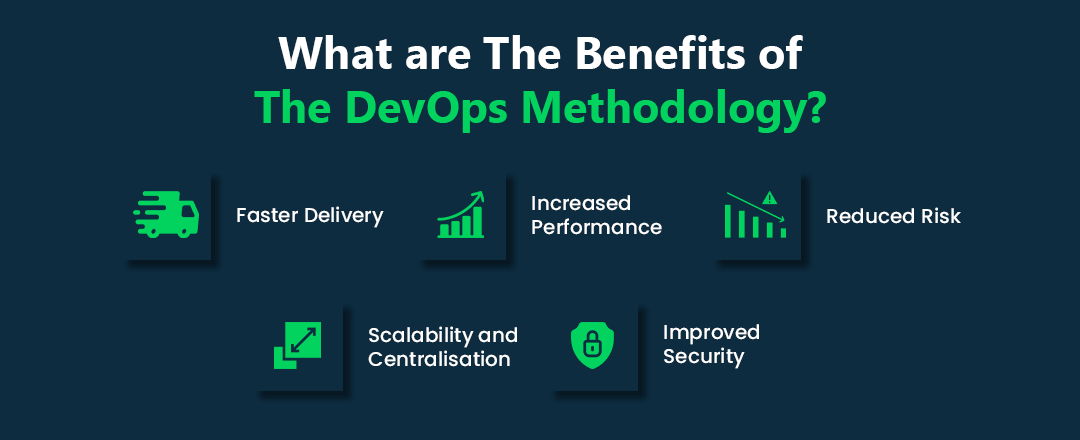 Faster Delivery: DevOps helps in reducing the time taken between identifying a requirement and making it available to end users. DevOps environments enable IT and operations teams to focus on developing, testing, and deployment rather than continual configuration management efforts. So changes are deployed fast enough that the system can respond quickly to new requirements.
Faster Delivery: DevOps helps in reducing the time taken between identifying a requirement and making it available to end users. DevOps environments enable IT and operations teams to focus on developing, testing, and deployment rather than continual configuration management efforts. So changes are deployed fast enough that the system can respond quickly to new requirements.
Increased Performance: By combining test-driven development with continuous integration and deployment, you get a software project based on fine-grained automated tests and an ability to move quickly. This means you get an application that is stable as well as reliable for users.
Reduced Risk: Test-driven development allows for faster identification of faults or bugs in software during the initial stages of development. This is achieved by continuous integration.
Scalability And Centralization: DevOps reduces time to market thanks to the development with a small number of agile teams, which makes it easier to assess the risk and central management of production systems – reducing the software, so you get better overall performance and scalability.
Improved Security: DevOps reduces the risk of introducing new vulnerabilities into an environment by automating many operations and maintenance tasks that are common across all environments, as well as moving your application infrastructure and core systems out of a single set of critical control points (like a single firewall).
Limitations of DevOps
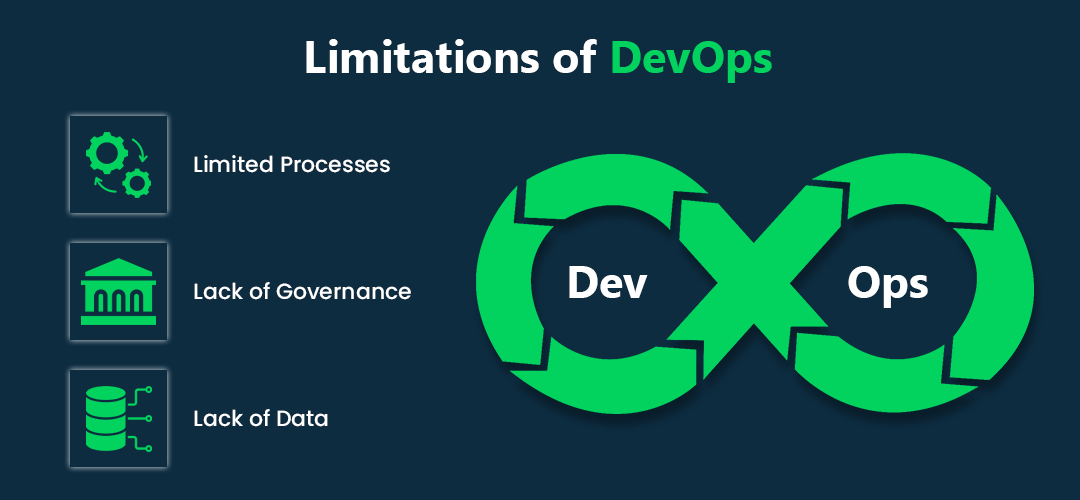 Limited Processes: DevOps has no standard processes and tools – it can be effectively applied to a wide range of situations.
Limited Processes: DevOps has no standard processes and tools – it can be effectively applied to a wide range of situations.
Lack Of Governance: DevOps is not a set of standards for how to do your project or run it, but rather a commitment to using Agile methods and tools.
Lack Of Data: Because DevOps relies on continuous integration between all environments and the ability to rapidly deploy changes to those environments, there isn’t a lot of data available to trace changeability or the full application life cycle. This can make it challenging to track configuration changes over time.
Lack Of Resources: There is a need for sufficient funding, which means there needs to be a commitment from everyone involved in implementing DevOps. So your team should be equipped with tools and knowledge to help them with their work and give them the needed support throughout implementation.
What is Agile Delivery Methodology?
The Agile Delivery Methodology (ADM) defines a framework designed to guide delivery teams in achieving and maintaining success by learning and adapting to change. Agile Software Development (ASD) is an iterative, incremental approach to software development that promotes adaptive planning, evolutionary development, early delivery, and continuous improvement.
By responding to change quickly and reliably, Agility enables the business to focus on its strategic direction and competitive advantage rather than reacting to a set of requirements imposed by the IT department. ADM complements ASD by adding a number of other elements that help facilitate success.
 The three core principles behind the Agile Delivery approach are:
The three core principles behind the Agile Delivery approach are:
- Achieving predictability and repeatability through automated testing and continuous integration.
- Continuous validation of customer value through requirements, design, planning, and monitoring stages.
- Setting stakeholder expectations. This includes having regular demos to ensure everyone is first-hand aware of the project’s current status.
Benefits of Agile Methodology
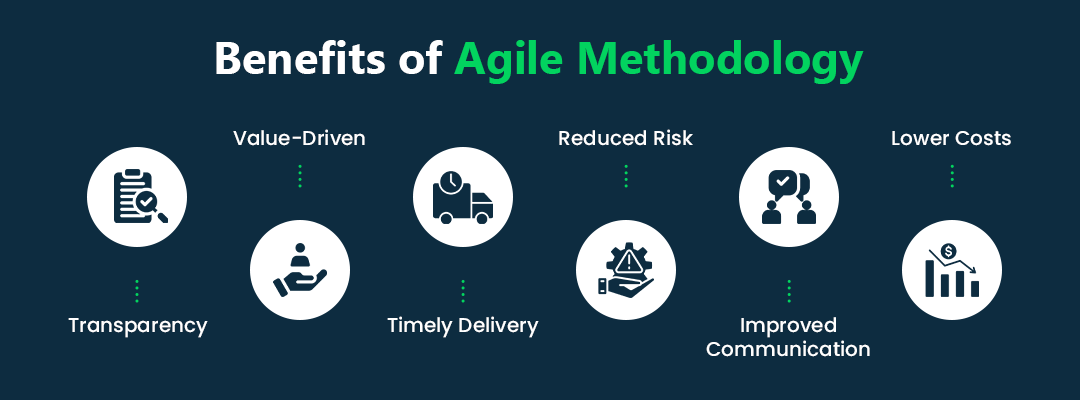 Transparency: Fewer decisions are made based on guesswork and more clarity regarding the impact of decisions. The Agile approach includes daily standup meetings and regular demos to help keep everyone up to date.
Transparency: Fewer decisions are made based on guesswork and more clarity regarding the impact of decisions. The Agile approach includes daily standup meetings and regular demos to help keep everyone up to date.
Value-Driven: It’s easier to see when a project delivers value as it will have been designed with an end-user in mind. New functionality can be brought into production quickly, with input from various stakeholders to meet their specific needs.
Timely Delivery: There is less pressure from customers and stakeholders for early delivery dates – one of the most significant issues with traditional software development projects due to the long timeframes involved in defining requirements and developing software systems.
Reduced Risk: Agile methodologies have a number of benefits for any project. The checks and balances involved in the agile approach ensure that risks are identified early and managed accordingly. In addition, requirements have greater transparency, which helps limit high-risk situations.
Improved Communication: Agile methodologies promote effective communication between stakeholders to help resolve any issues that may arise throughout a project’s lifetime – including collaboration with peers on projects.
Lower Costs: Achieving predictability and repeatability in software development through continuous testing leads to improved efficiency and lower costs for bespoke software development projects over time.
Limitations of Agile
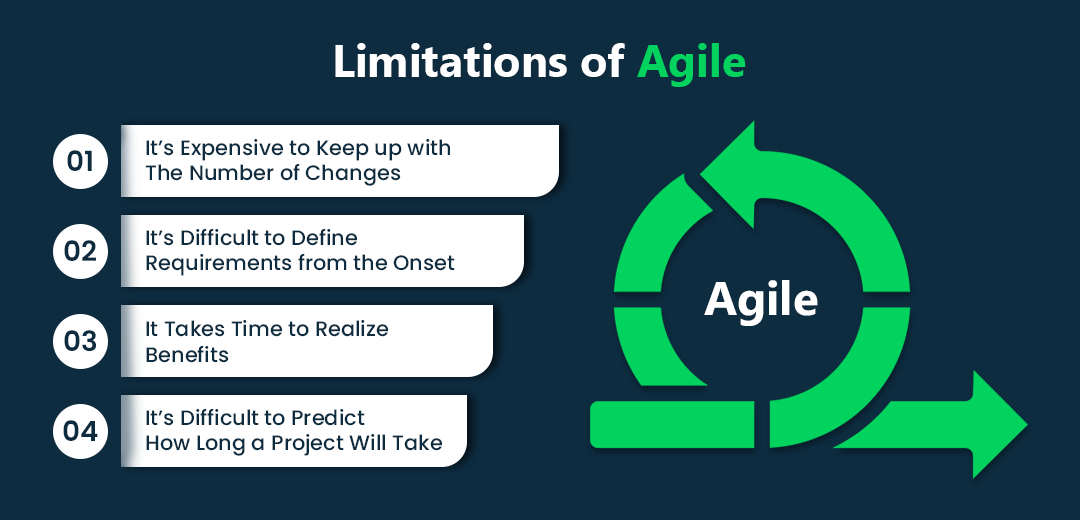 It’s expensive to keep up with the number of changes: Agile methodologies help to ensure that software projects meet their goals, but continual changes in requirements can make this a challenge.
It’s expensive to keep up with the number of changes: Agile methodologies help to ensure that software projects meet their goals, but continual changes in requirements can make this a challenge.
It’s difficult to define requirements from the onset: Establishing a clear set of requirements at the outset of any project is frequently difficult, particularly for large-scale projects with multiple stakeholders and subject matter experts. This makes it more challenging for project managers and delivery teams to keep track of progress and deliverables.
It takes time to realize benefits: The benefits of agile methodologies require time to achieve. Achieving predictability and repeatability in software development through continuous testing is only achievable with a particular set of project requirements and in a particular organizational culture.
It’s difficult to predict how long a project will take: Establishing a clear set of requirements at the outset of any project is frequently tricky, particularly for large-scale projects with multiple stakeholders and subject matter experts. This makes it more challenging for project managers and delivery teams to keep track of progress and deliverables.
What’s the Difference?
- DevOps is a philosophy centered on automating processes that make it more efficient to deploy one change rather than many changes; it also includes making these deployments reproducible so that any environment can be set up in minutes.
- Agile philosophy focuses on iterative releases, customer collaboration, and user acceptance and includes planning.
- DevOps practices include automation, continuous integration and deployment (CI/CD), release planning and management (such as infrastructure configuration), testing (both automated and manual), documentation of development processes and results, and monitoring infrastructure changes to detect problems as they occur.
- Agile practices include customer collaboration, collaboration with others during agile planning efforts to estimate effort requirements during sprint planning, and early decision-making by prototyping or gathering feedback from stakeholders before committing to the next release.
- Some Agile teams and practices lean toward being more agile and may include requirements gathering, meetings, estimation, and prioritization.
- DevOps practices: Deployment tools such as Chef or Puppet automate the deployment process. Deployments can be automatically tested before they reach production, called continuous deployment. Monitoring tools such as New Relic are used to collect and analyze application performance data in order to identify problems before they happen.
- Agile practices: Project management, including project planning and tracking through a task board or spreadsheet. The tasks are often completed by individuals who have measurable progress toward completion.
Which one to choose for software development?
Both of them had their pros and cons. It will all depend on what situation requires you want to implement. You need to know the requirements and then decide which one is going to be best suitable for your project.
Why should you hire a software development company?
Look for a Bespoke Software Development Company, which can help you choose the one to use per your unique project requirements. Both software development methodologies have different uses and work best for different projects. Hiring a Dedicated Software Development Team with years of experience working with them is always advisable.
 Here comes Auxano Global Services, a bespoke software development company. We have experienced software developers working on agile and DevOps methodologies. We know how each of them works and which one will be best suitable to project requirements.
Here comes Auxano Global Services, a bespoke software development company. We have experienced software developers working on agile and DevOps methodologies. We know how each of them works and which one will be best suitable to project requirements.
Agile Vs DevOps Conclusion:
Both Agile and DevOps software development methodologies have their own pros and cons. The best of them will always depend on different project requirements. There is no one-size-fits-all approach to software development, so it is crucial to hire a Dedicated Software Development Company that can help you choose the right one for your unique needs.
These methodologies are prevalent in modern-day software development due to their high adaptability and flexibility. It is difficult to choose between them as both are great for specific projects, depending on requirements.
If you want to hire a dedicated software development team to help you choose the right one, reach out to us today. Our well-tested processes ensure that your business objectives are met within the set deadline with our Agile or DevOps implementation services.
Hope you found the blog helpful!! If you want more information about our services, contact us online today or drop an email at [email protected].
Frequently Asked Questions
-
1. If I am looking for a DevOps software development company, then which one is better?
Both of them have their pros and cons. It will all depend on what situation requires you want to implement. You need to know the requirements and then decide which one is going to be best suitable for your project.
-
2. What if my project requirements include both methodologies? Should I choose both of them or go with just one? How will it be beneficial?
As said above, it all depends on what requirement your project needs to implement. You need to know the specific requirements and then decide which one is going to be best suitable for your project.
-
3. How many years of experience do you have in software development?
It’s been more than 15 years since we have been in the industry. We have experienced developers who have worked with these tools in the past and know how they work and which one will be best suitable for your project requirements. We are an experienced Software Development Company in US and UK, mainly focusing on providing the best Agile and DevOps implementation Services.
-
4. Which software development methodologies are you going to use for my project?
We have the experience of using both these methodologies for software development. But we will use the one that can match your business’s unique requirements at the time of development.



